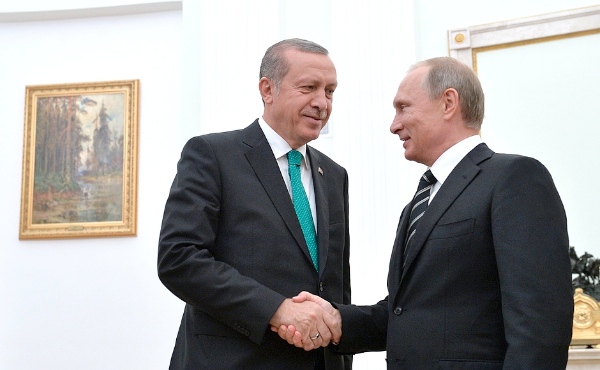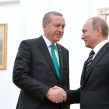
Putin Strains Wobbly Western Unity on Syria
Publication: Eurasia Daily Monitor Volume: 12 Issue: 173
By:

President Vladimir Putin is heading to New York to address the United Nations with a strong hand, while his United States counterpart, Barack Obama, seems weak and indecisive. According to Putin’s press secretary Dmitry Peskov, the summit with Obama on September 28 will be dominated by the Syrian crisis. US leadership in the Middle East has been put into question by Russia’s actions and possible troop deployments in Syria, leaving US allies increasingly in disagreement (Top.rbc.ru, September 24).
This week (September 23), Putin was the guest of honor together with his Turkish counterpart, Recep Tayyip Erdoğan, and other dignitaries at the opening of the rebuilt and radically expanded Moscow Grand Mosque. Putin used the occasion to portray himself as a benefactor of so-called “traditional Islam,” as opposed to Salafist jihadism. Putin promised to allow a Muslim religious academy in the Middle Volga region of Tatarstan and possibly open a Muslim religious educational center attached to the Moscow grand mosque. “We must educate our own Muslim clergy,” announced Putin, apparently to avoid sending Muslim students to Middle Eastern religious centers where they may be recruited by extremists (RIA Novosti, September 23).
Turkey made substantial donations to rebuilding Moscow’s grand mosque, but Erdoğan used the visit to discuss Syria and Russia’s moves to boost support of Syrian President Bashar al-Assad’s regime (see EDM, September 10, 17). After returning to Ankara, Erdoğan told reporters he was not fully pleased: “I did not see decisiveness in the Russian attitude. Our foreign ministers must further discuss the matter, possibly together with Iran and the US. The crisis must be resolved without al-Assad, but he may be involved in the transitional period” Erdoğan denounced the US for supporting the Syrian Kurdish Democratic Union Party (PYD) that, together with US and allied air forces, is successfully opposing the Islamic State (IS) in northeastern Syria. According to Erdoğan, the PYD is a terrorist organization just as bad as the Islamic State (RIA Novosti, September 24).
Erdoğan, while opposed to the IS, wants al-Assad out, as do the US and its allies, including Gulf Arab nations. Putin, together with Iran, Hezbollah and the Shia-dominated government of Iraq oppose the Islamic State, but support al-Assad. Putin has called for the creation of a “broad coalition” to oppose the IS and has argued that al-Assad’s loyal military is the best anti-IS force on the ground in Syria. Putin insists the PYD armed militia must be an essential part of any anti-IS “broad coalition” (see EDM, September 17). The PYD coordinates with al-Assad, which may explain why Putin sees the Kurds as allies. Meanwhile, the US supports the Kurdish militia, putting Putin on the same side as Washington [and al-Assad] against Erdoğan regarding the PYD, further complicating matters.
A continuous stream of reports about Russian troop deployments in Syria are adding to the discord between members of the US-led coalition, though the actual facts are fuzzy. It has been reported that up to 1,700 Russian troops have been deployed in the Russian naval outpost in Tartus on the Syrian Mediterranean coast. According to Russian military experts such a deployment is unlikely: The Tartus outpost is too small to house such a force and there is little military sense in sending additional combat troops to this remote area. Plans to expand the Russian naval outpost apparently exist, but this would require time and money. The outpost in Tartus does not have an airstrip and cannot be used as a base of further Russian operations in Syria (Moscovsky Komsomolets, September 21).
A more serious possibility is the possible establishment of a large Russian military airbase near Latakia—the main Syrian Mediterranean port city north of Tartus. A squadron (possibly 12) Su-24M bombers, a squadron (possibly 12) Su-25 attack jets, several Su-30CM fighter-bombers and helicopters for close air support and pilot rescue/evacuation missions could be deployed in Latakia together with some antiaircraft defense assets. Such a force could project airpower over Syria, hitting ISIS targets and possibly other secular and non-secular forces opposed to al-Assad. Such an airbase would require a large (battalion-strong) ground maintenance and command/control staff, radar and air control crews, an air defense unit and a combat battalion tactical group with armor and artillery to defend the base from possible land attack by Syrian rebels. A Russian air force general could be appointed commander of an overall force of some 2,000 men. This Russian expeditionary aerial attack force would need reliable means to gather intelligence to hit the right targets in Syria (traditionally a weak point of the Russian military). Depending on the US to provide targeting information would be unacceptable—even if Moscow and Washington agree to coordinate their actions. (Vedomosti, September 23).
The Kremlin has dismissed as “media speculation” reports of possible Russian deployments in Syria. Peskov told journalists in Moscow, he did not know about the Kremlin preparing to ask the upper house of parliament—the Federation Council—to vote to allow a combat deployment of Russian troops in Syria as required by the constitution: “I did not see any such document.” Still Peskov’s repudiation seems deliberately vague: “Most of the media reports [of troop deployments] are false, it would be stupid and counterproductive to comment each.” At the same time Peskov enthusiastically supported a statement by German Chancellor Angela Merkel, who reportedly called for al-Assad to be included in the political process of a possible Syrian settlement (Rossyskaya Gazeta, September 24).
Other regional actors, particularly Israel, are taking the possibility of Russian combat deployment seriously. On September 21, hours before Yom Kippur closed down all business in Israel, prime minister Benjamin “Bibi” Netanyahu came to Moscow together with the chiefs of the Israeli Defense Force (IDF) and military intelligence to meet Putin and the Russian top military brass in the Kremlin. During the Cold War Israelis engaged secretly deployed Russian pilots and soldiers in Syria, Egypt and Lebanon. The Russian and IDF military reportedly agreed to coordinate future actions in the region to avoid friendly fire incidents, while Putin assured Netanyahu that Russian actions are not aimed at Israel and Russian military equipment will not be used by Hezbollah, Iran or al-Assad against Israel. (Rossyskaya Gazeta, September 22).
Obama failed Netanyahu and the Gulf Arab states on the Iran nuclear issue this summer and is dismally failing in Syria. By deploying or threatening to deploy limited assets, and being seen as acting decisively, Putin is suddenly becoming the top power broker in the Middle East.




